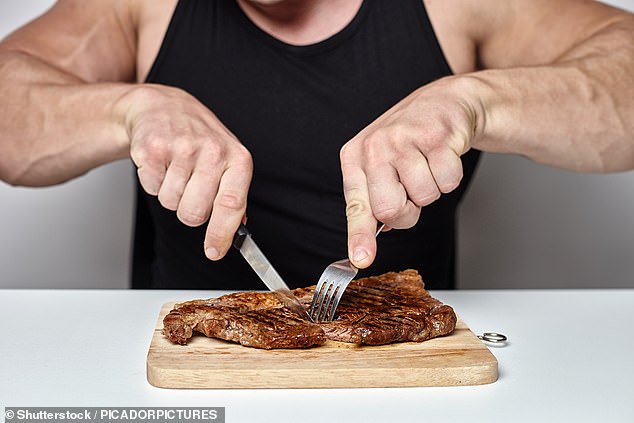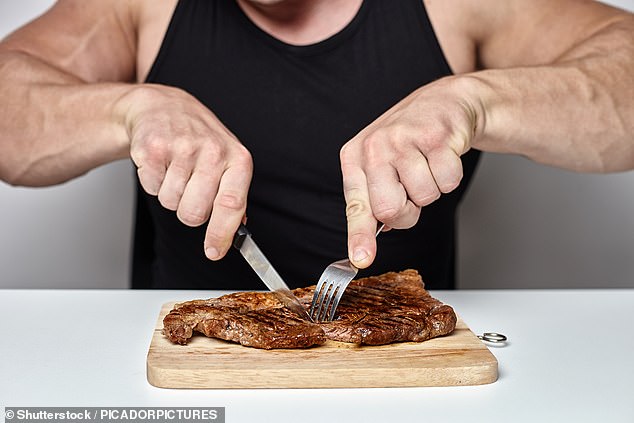Is RED MEAT in the diet driving the type 2 diabetes epidemic? Eating steak increases the risk, say scientists who insist that adopting a ‘plant-based’ diet could help protect against the disease




Can Eating Steak Increase Your Risk of Diabetes? Yes, according to U.S. experts who studied the diets of more than 200,000 adults over a 36-year period.
Harvard scientists’ research found that people with high levels of heme iron (the iron found in red meat) had up to a 26 percent higher risk of type 2 diabetes.
However, the experts said this was not the case with plant sources of iron, such as beans and spinach.
According to the researchers, their findings suggest that reducing red meat consumption and switching to a plant-based diet may help reduce the risk of diabetes.
The experts also warned vegetarians and vegans who take heme iron supplements that they are at greater risk of developing type 2 diabetes.

In the study, scientists from the Harvard TH Chan School of Public Health in Boston found that people with high levels of heme iron, the iron found in red meat, had up to a 26 percent higher risk of developing type 2 diabetes.
Publish their findings in the journal Nature MetabolismThe authors said their research complemented previous work supporting a link between heme iron and type 2 diabetes.
Their findings are based on data from a long-term survey of more than 200,000 nurses and healthcare professionals in the US.
Scientists examined how much iron the participants consumed and in what form: heme iron, plant iron or from supplements such as iron-boosting pills.
This information was then compared to the participants’ health information to see if they had type 2 diabetes, taking into account several other health and lifestyle factors.
People with the highest heme iron intake were found to have a 26 percent greater risk of type 2 diabetes than people in the group with the lowest intake.
In a separate analysis, the blood composition of a subgroup of study participants was also examined.
This study investigated whether there were biomarkers (chemical characteristics) in the blood that were related to the way the body processed iron and to diabetes.
Experts found that higher heme intake was associated with more signs of type 2 diabetes in the blood, and lower biomarkers were associated with a lower risk of diabetes, supporting their analysis.
The authors said their research had implications for dietary guidelines and public health strategies to reduce diabetes in the population.
They also pointed out that the findings have implications for vegetarians and vegans who add heme iron to their diets and who believe they are immune to the negative health effects of red meat.
Heme iron is also sometimes added to fake meats such as vegan burgers to enhance their “meat-like” taste and appearance.

Nearly 4.3 million people were living with diabetes in 2021/22. And another 850,000 people have diabetes without knowing it, which is worrying because untreated type 2 diabetes can lead to complications including heart disease and stroke.
Professor Frank Hu, an expert in nutrition and epidemiology and one of the study’s authors, said: ‘This study underlines the importance of healthy food choices in preventing diabetes.’
He added: ‘Reducing heme iron intake, particularly from red meat, and switching to a more plant-based diet may be effective strategies to reduce the risk of diabetes.’
Red meat has been viewed negatively for decades, with a wealth of evidence suggesting that eating too much red meat can increase your risk of heart disease, cancer, and premature death.
While it is a good source of protein, vitamins and minerals, including iron, zinc and B vitamins, it can also be high in salt and saturated fat.
Red meat was previously thought to increase the risk of diabetes due to its saturated fat content and the salt content in some processed versions.
Eating too much saturated fat can lead to an increased risk of obesity, which is itself a risk factor for diabetes. Some studies have also shown that too much salt, which is found in large amounts in red meats such as bacon, is also linked to the risk of type 2 diabetes.
The latest research is part of a series of studies that have identified heme iron as another risk factor. This substance is believed to interfere with insulin production in the body.
Insulin is the hormone our bodies produce to regulate blood sugar levels. People with diabetes do not produce enough insulin naturally, which means their blood sugar levels get too high.
However, the link between red meat and diabetes is observational. That is, it cannot be proven that red meat, or the amount of heme iron in red meat, directly causes type 2 diabetes. Nor can other factors play a role.
The latest study was also conducted on a cohort that was nearly 80 percent female, and overwhelmingly white, meaning the findings may have limited implications for men and other ethnic groups.
Another limitation is that the participants’ iron intake data were self-reported. This means that there may be errors in the data.
Health authorities in the UK recommend eating no more than 70g of red meat (such as beef, lamb or pork) or processed meat (such as ham, bacon and salami) per day.
Red meat is rich in iron, which is essential for the production of red blood cells.
If you don’t get enough iron, you are at greater risk of anemia.

Experts in the latest study said their findings suggested that reducing red meat consumption and adopting a plant-based diet could help lower the risk of diabetes
Fatigue, shortness of breath, palpitations, paler than normal skin and headaches are all signs of iron deficiency.
Although a vegan or vegetarian diet can be high in iron, the iron in plant foods is not absorbed as well by the body as the iron in meat. Therefore, it is very important to eat the right foods.
The British Dietician Association advises vegans to consume foods or drinks containing vitamin C with plant-based iron. This helps the body to more easily absorb this form of the mineral iron.
Examples of foods rich in vitamin C include oranges, both fresh and juiced, strawberries, bell peppers, Brussels sprouts, and potatoes.
According to the NHS, men aged 19 and women over 50 need 8.7mg of iron per day, and women aged 19 to 49 who have their periods need around 14.8mg per day.
For comparison, ground beef contains about 5.8 mg per 160 gram serving and lentils contain 4.9 mg per 125 gram serving.
According to the NHS, pulses, wholegrain bread, fortified breakfast cereals, leafy greens, nuts and dried fruit are all good sources of iron.
There are around 5 million people in the UK living with diabetes, with an estimated 850,000 people unaware they have the condition.
A recent report from Diabetes UK has revealed a staggering 39 percent increase in type 2 diabetes in people under 40. This trend has been attributed to rising obesity rates.




